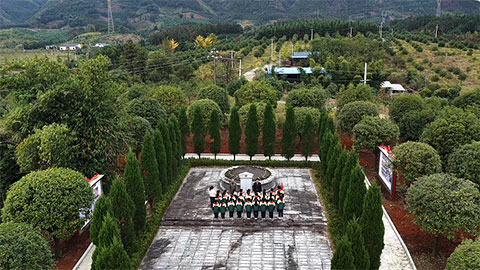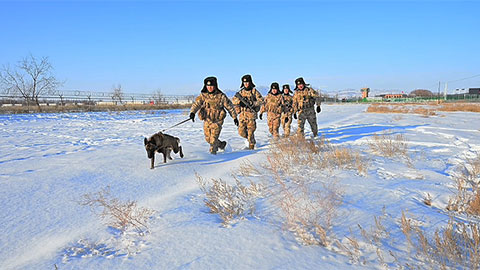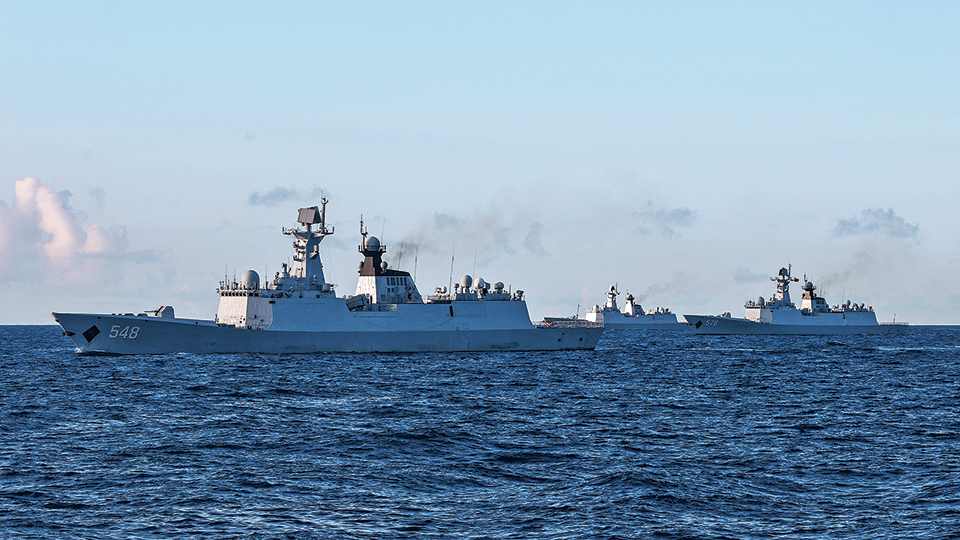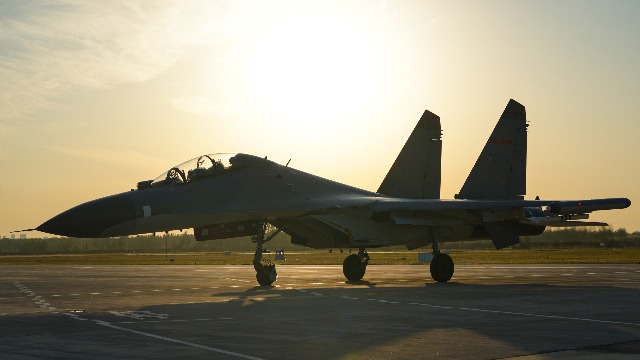By Zhao Long
赵隆
DPRK top leader Kim Jong-un visited Russia last week, during which he held talks with Russian President Vladimir Putin and toured many places in the Russian Far East. This visit together with the previous Russian visit of the Chinese Foreign Minister Wang Yi are normal transactions within the scope of their respective bilateral relations, which are exploited by politicians and media of some countries to back up the so-called theory of "new authoritarian axis". The author believes at least two motives lurk behind this hype.
朝鲜最高领导人金正恩上周访问俄罗斯,其间与俄罗斯总统普京举行会谈并到访俄远东多地。加上王毅访俄,这两次访问本是俄朝、中俄双边关系范畴内的事务,却被其他个别国家政客和媒体用于“论证”所谓中俄朝三国形成新“轴心国”、复制冷战时期东北亚地区“北三角”(中国、苏联、朝鲜)与“南三角”(美国、日本、韩国)的对立格局。笔者认为,这种炒作背后至少具有双重动机。
The primary motive is to increase the legitimacy of the US-Japan-ROK military alliance.
首要动机就是增加美日韩构建军事同盟的合理性。
It will help lend supportability for the US, Japan and the ROK to replicate the triangular military alliance by brutally embedding the bilateral exchanges between China and Russia, China and the DPRK, and Russia and the DPRK into the discourse logic of the trilateral linkage among them.
将中俄、中朝、俄朝之间的双边往来,强行嵌入中俄朝三方联动的话语逻辑之中,有助于增加美日韩复制“三角式”军事联盟的合理性。
Since the further escalation of the Ukraine crisis last year, Western media have begun to publicize the arguments like "convergence of China, Russia and the DPRK incurring a new Cold War pattern on the Korean Peninsula" and "the most severe moment since the end of the Korean War". In tandem with this, the US, Japan and the ROK have significantly increased strategic alignment activities, and the leaders of the three countries have met on multilateral occasions including the NATO summit. In particular, the trilateral leaders' summit at Camp David in August 2023 marked the first meeting of the three parties beyond the multilateral platforms, which defined the institutionalized measures for future political, military security, economic and technological, and people-to-people cooperation among the three countries.
自去年乌克兰危机进一步激化升级以来,西方媒体就开始宣扬“中俄朝三国走近导致朝鲜半岛呈现新冷战格局”“朝鲜战争结束之后的最严峻时刻”等论调。与此同时,美日韩显著提高“战略对表”的频次,三国领导人先后借助北约峰会等多边场合举行会晤。尤其是今年8月美日韩领导人的戴维营峰会,更是成为三方在多边平台以外的首次会晤,明确了未来政治、军事安全、经济技术、人文合作的机制化措施。
A secondary motive is to awaken the Cold War memories of neighboring countries.
次要动机则是借此“唤醒”周边国家的冷战记忆。
Amid the increasingly intensified major country competition and geopolitical conflicts, some forces spare no effort to preach the new Cold War pattern in Northeast Asia, with the aim of awakening the Cold War memories of the Korean War in neighboring countries and forcing them to take sides in order to alleviate their own sense of insecurity by exaggerating the tense atmosphere.
在大国竞争和地缘冲突日益加剧的背景下,一些势力不遗余力地鼓吹东北亚“新冷战格局”,目的是利用大国竞争加剧的氛围,唤醒周边国家对于朝鲜战争的冷战记忆,迫使各国通过选边站队缓解自身的不安全感。
While bloating the so-called "China-Russia-DPRK convergence posing real threats", they also don't forget to bad-mouth the prospects, saying that the cohesion of the three countries is significantly inferior to the mutual trust and cooperation degree reflected by the other triplex at the Camp David summit, exposing the ambivalence of peddling panic and self-boasting within them.
而在极力渲染所谓“中俄朝三国走近造成现实威胁”的同时,这类炒作又不忘唱衰其前景,称三国的凝聚力远不及美日韩在戴维营峰会上展现的互信和协作水平,暴露出既兜售恐慌又自我吹嘘的矛盾心态。
Nevertheless, these groundless and illogical opinions are clearly unconvincing.
但无论如何,这种毫无根据、逻辑混乱的论调明显缺乏说服力。
First, such opinions do not conform to the bilateral relation logic of the concerning countries.
首先,不符合三组双边关系的运行逻辑。
In recent years, the development of the bilateral relations between China and Russia, China and the DPRK, and the DPRK and Russia has been built on the basis of equality and mutual benefits, with no linkage or dependency among the three parties, nor confrontation or aggression against any third party.
近年来,中俄、中朝、朝俄三组双边关系的发展都建立在平等互利的基础上,既不存在相互间的联动性、依附性,更不具备针对第三方的对抗性、侵略性。
As made clear in the Joint Statement on Deepening the Comprehensive Strategic Partnership of Coordination for the New Era between China and Russia, the bilateral relations between the two countries differ from the kind of military-political alliance seen during the Cold War. Instead, the two countries transcend such a model of state-to-state relations, adopting an approach of no-alliance, no-confrontation and no-targeting of any third party. As friendly neighbors connected by mountains and rivers, China and the DPRK also have firmly supported each other on issues concerning their core interests and major concerns and maintained close coordination in the international multilateral arena. The two countries neither have nor need to establish a common imaginary enemy to promote their traditional friendship and partnership.
正如《中俄关于深化新时代全面战略协作伙伴关系的联合声明》所明确的,两国关系不是类似冷战时期的军事政治同盟,而是超越该种国家关系模式,具有不结盟、不对抗、不针对第三国的性质。中朝作为山水相连的友好邻邦,在涉及彼此核心利益和重大关切问题上坚定相互支持声援,在国际多边舞台密切协调配合,没有也无需树立共同的“假想敌”来推动传统友好合作关系。
Second, such opinions do not meet the general expectations of regional countries.
其次,不符合本地区国家的普遍期待。
In the Spirit of Camp David joint statement of the US, Japan and the ROK, the agendas involved in their cooperation not only cover affairs of the Korean Peninsula, but also those of ASEAN, Pacific island countries and other Indo-Pacific regions, and even peace and prosperity of the world. They also talked about the South China Sea issue in a strong and forceful rhetoric, and planned to launch the Indo-Pacific trilateral dialogue mechanism and regularly hold trilateral joint military exercises.
在美日韩描绘所谓合作蓝图的《戴维营精神》联合声明中,合作所涉及的议题不仅包括朝鲜半岛,还包括“东盟、太平洋岛国等‘印太地区’及世界的和平与繁荣”,并使用强硬措辞谈及南海问题,计划启动“印太地区三边对话机制”,定期举行三方联合军演。
It is not difficult to find through careful observation that the forcible binding of China, Russia and the DPRK can not only endorse the establishment of the US-Japan-ROK military alliance but also woo ASEAN and Pacific island countries to cooperate in containing and suppressing China by creating panic. However, at the recently concluded 43rd ASEAN Summit and Leaders' Meetings on East Asia Cooperation, most countries stressed upholding the centrality of ASEAN and refused to take sides or become a proxy of major power competition. The joint communique of the ASEAN Foreign Ministerial Meetings also emphasized the principle of no-alliance, indicating that regional countries refuse to return to the Cold War-style confrontation pattern.
仔细观察不难发现,将中俄朝“强行绑定”不但可以为构建美日韩军事同盟背书,还可通过制造恐慌,拉拢东盟和太平洋岛国配合对华围堵遏压。然而,在不久前结束的第43届东盟峰会及东亚合作领导人系列会议上,多数国家强调坚持东盟中心地位,拒绝选边站队或成为大国竞争的“代理人”,东盟外长会议联合公报还着重强调不结盟原则,表明地区国家拒绝重回冷战式的对立格局。
Finally, such opinions are not in line with the security concept and development concept advocated and practiced by China.
最后,不符合中国倡导并践行的安全观和发展观。
Undoubtedly, confronted with increasing regional activities of hegemonism, unilateralism and power politics, many countries including China, Russia and the DPRK do have a consensus against the Cold War mentality and bloc confrontation, as well as small cliques targeting specific countries. The alliance security model guided by the polarizing "friend or foe" mentality is not in line with the Global Security Initiative advocated by China, especially its vision of common, comprehensive, cooperative and sustainable security.
不可否认,面对本地区不断加剧的霸权主义、单边主义、强权政治行径,包括中俄朝在内的许多国家的确存在反对冷战思维、阵营对抗,反对搞针对特定国家“小圈子”的共识,但以二元对立“敌我思维”为指导的“同盟安全”模式不符合中国倡导的全球安全倡议,尤其是不符合共同、综合、合作、可持续的安全观。
Furthermore, promoting the US-Japan-ROK supply chain early warning system (EWS) by clamoring for the threats of China-Russia-DPRK linkage is basically also part of their "decoupling and breaking chains" or so-called "derisking" against China, which will inevitably only further aggravate the regional security and development dilemmas. China’s Approach to Global Governance points out that development is the eternal pursuit of mankind and the shared responsibility of all countries. China prioritizes achieving complementary advantages and coordinated development through bilateral and multilateral cooperation and maintains regional peace and stability on the basis of development.
另外,通过渲染中俄朝联动的“威胁”来推动打造美日韩“供应链预警系统”,本质也是对华“脱钩断链”或所谓“去风险”的一部分,当然结果只会进一步加剧地区安全困境和发展困境。《关于全球治理变革和建设的中国方案》指出,发展是人类社会的永恒追求,也是世界各国的共同责任。通过双边合作和多边协作,实现优势互补和联动发展,以发展为依托维护地区和平与稳定,才是中国考虑的优先事项。
In short, cherishing twisted world outlook and security concept, politicians and media of certain countries willfully distort the three sets of bilateral relations among China, Russia and the DPRK, misleadingly fueling the speculation of the recurrence of so-called southern and northern triangle opposition in the Northeast Asia. Such typical behavior resultingfrom the Cold War mentality brings nothing but harm to maintaining peace and stability and promoting common development and prosperity in the regions.
简言之,个别国家政客和媒体对中俄朝三组双边关系的故意曲解,对于东北亚地区重现“南北三角”对立格局的危言耸听,再次暴露其世界观、安全观的扭曲,是冷战思维作祟的典型案例,对维护地区和平稳定、促进共同发展繁荣来说有百害而无一利。
(The author is Assistant Director of the Institute for Global Governance Studies and Senior Research Fellow at Shanghai Institutes for International Studies)
(作者是上海国际问题研究院全球治理研究所副所长、研究员)




















